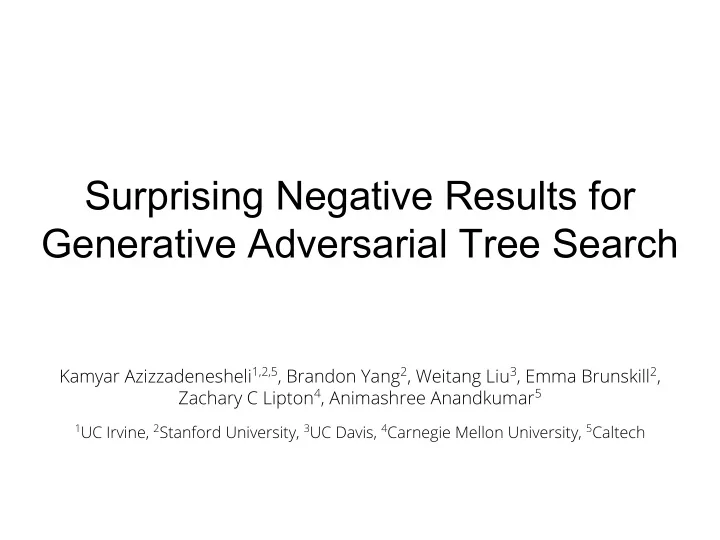

Surprising Negative Results for Generative Adversarial Tree Search Kamyar Azizzadenesheli 1,2,5 , Brandon Yang 2 , Weitang Liu 3 , Emma Brunskill 2 , Zachary C Lipton 4 , Animashree Anandkumar 5 1 UC Irvine, 2 Stanford University, 3 UC Davis, 4 Carnegie Mellon University, 5 Caltech
Introduction: Deep Q-Network (DQN) FC1 Conv2 Conv1 Up 0.5 Down 2.0 Stay 1.5
Introduction: DQN The DQN estimation of the Q-function can be arbitrarily biased (Thrun & Schwartz 1993, Antos et al. 2008) We empirically observe this phenomenon in DQN for Pong
Generative Adversarial Tree Search Given a model of the environment: 1. Do Monte-Carlo Tree Search (MCTS) for a limited horizon 2. Bootstrap with the Q function at the leaves
Generative Adversarial Tree Search Given a model of the environment: 1. Do Monte-Carlo Tree Search (MCTS) for a limited horizon 2. Bootstrap with the Q function at the leaves [Prop. 1] Let e Q be the upper bound on the error in estimation of the Q-function. In GATS with roll-out horizon H, it contributes to the error in estimation of the return as 𝛿 H e q .
Generative Dynamics Model Generates next frames conditioned on the current frames and actions
Negative Results
The Goldfish and the Gold Bucket
The Goldfish and the Gold Bucket
Conclusions We develop a sample-efficient generative model for RL using GANs Given a fixed Q-function, GATS reduces the worst-case error in estimation from the Q-function exponentially in roll-out depth as 𝛿 H e q . Even with perfect modeling, GATS can impede learning of the Q-function. This study of GATS highlights important considerations for combining model-based and model-free reinforcement learning.
Recommend
More recommend